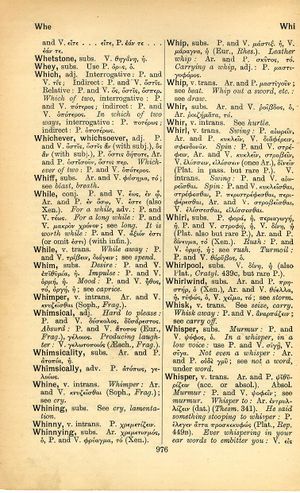while: Difference between revisions
From LSJ
Ζευχθεὶς γάμοισιν οὐκέτ' ἔστ' ἐλεύθερος → Haud liber ultra est, nuptiae quem vinciunt → Wer durch der Ehe Joch vereint, ist nicht mehr frei
(Woodhouse 5) |
(CSV5) |
||
| Line 1: | Line 1: | ||
{{ | {{Woodhouse1 | ||
| | |Text=[[File:woodhouse_976.jpg|thumb|link={{filepath:woodhouse_976.jpg}}]]'''conj.''' | ||
P. and V. ἕως, ἐν ᾧ. Ar. and P. ἐν ὅσῳ, V. [[ἔστε]] (also Xen.). | |||
<b class="b2">For a while</b>, adv.: P. and V. [[τέως]]. | |||
<b class="b2">For a long while</b>: P. and V. μακρὸν [[χρόνος]]; see [[long]]. | |||
<b class="b2">It is worth while</b>: P. and V. ἄξιόν ἐστι (or omit ἐστι) (with infin.). | |||
'''v. trans.''' | |||
<b class="b2">While away</b>: P. and V. τρίβειν, διάγειν; see [[spend]]. | |||
}} | }} | ||
Revision as of 10:09, 21 July 2017
English > Greek (Woodhouse)
conj.
P. and V. ἕως, ἐν ᾧ. Ar. and P. ἐν ὅσῳ, V. ἔστε (also Xen.).
For a while, adv.: P. and V. τέως.
For a long while: P. and V. μακρὸν χρόνος; see long.
It is worth while: P. and V. ἄξιόν ἐστι (or omit ἐστι) (with infin.).
v. trans.
While away: P. and V. τρίβειν, διάγειν; see spend.

